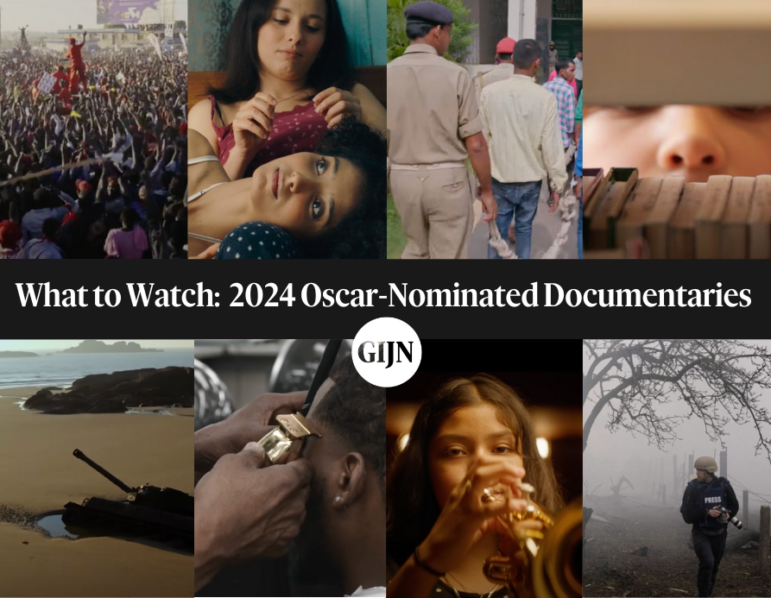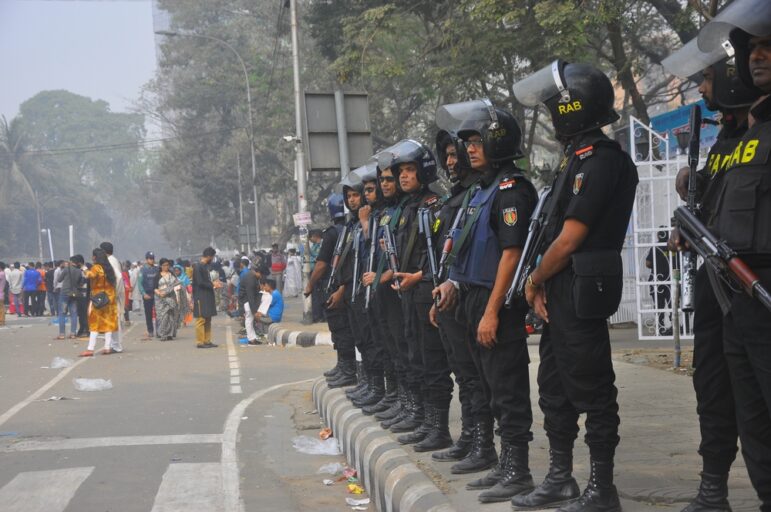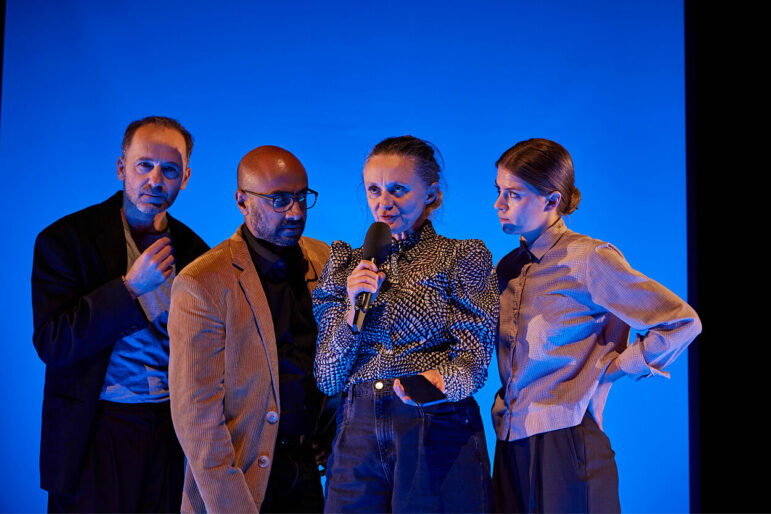

Oscars 2024: Celebrating Documentary Film
A vital film, “20 Days in Mariupol,” took home the Academy Award for best documentary feature in 2024. This was the first time that the Associated Press — whose reporters were trapped in the Ukrainian city in 2022 during a siege by Russian forces — had been nominated for an Academy Award.
The feature’s director, Mstyslav Chernov, a Ukrainian journalist who documented the invasion in early 2022, noted when he accepted the award that the Oscar was the first for a Ukrainian film. “I am honored, but I will probably be the first director on this stage to say that I wish I had never made this film,” said Chernov.
Other documentaries nominated this year explored a Ugandan singer-turned-politician’s 2021 presidential campaign, a Tunisian mother’s attempts to come to terms with the loss of two daughters who became radicalized and ran away to join IS, and an Indian father’s battle to find justice for his daughter after she was abducted and raped.
Paying tribute to the subject of last year’s best documentary feature, the Academy recognized Alexei Navalny at the beginning of the show’s In Memoriam segment. This time last year, Navalny was still alive, and the Daniel Roher film about his life and comeback after a poisoning attempt was awarded the Oscar for best documentary feature film.
Navalny was even asked in the film: “If you are killed, if this does happen, what message do you leave behind to the Russian people?”
“Come on Daniel, no,” Navalny responded, smiling. “No way. It’s like you’re making a movie for the case of my death.”
One year later, the parents of Navalny have just had to bury their son in a tightly controlled ceremony after he died in a prison camp in the Arctic. While the authorities say Navalny died of natural causes, a chorus of international voices have blamed Russia’s president, Vladimir Putin, for his death.
The Navalny documentary has a particular poignancy given what has happened. Diving back to 2023, while accepting the award, Roher, stood with Navalny’s wife and children beside him on stage, said: “Alexey, the world has not forgotten your vital message to us all: We cannot, we must not be afraid to oppose dictators and authoritarianism wherever it rears its head.”
He also thanked Bellingcat’s Christo Grozev for the work he had done on investigating who poisoned Navalny. “Christo, you risked everything to tell this story, and it’s investigative journalists like you and Maria Pevchikh [from Navalny’s anti-corruption investigation] that empower our work.”
While the Oscars are known for glitz and glamor, recognition here bestows a higher level of prestige and, in many cases, can bring urgent or in-depth reporting to a global audience.
Best Documentary Feature Film
“20 Days in Mariupol”
The Ukrainian journalist Mstyslav Chernov arrived in the port city of Mariupol an hour before the war began. Soon, Russian tanks bearing the letter “Z” were spotted on the streets, and Chernov, along with his colleagues from the Associated Press, were the only international reporters who remained in the city to chronicle the onslaught of attacks.
This film, which gave the AP its first Oscar nomination — and win — in its 178-year history, and which was a joint project between the AP and PBS “Frontline,” tells the story of the residents of a city that bore the brunt of the early days of the Russian invasion. Chernov is a Pulitzer Prize-winning reporter and before the film won the Oscar it was a winner of the Audience Award for World Cinema Documentary at the Sundance Film Festival.
“The war has begun and we have to tell its story,” Chernov says in the film. “This is painful to watch. But it must be painful to watch… If the world saw everything that happened in Mariupol, it would give at least some meaning to this horror.” He wrote about the experience — and how they were on a Russian kill-list even as they were filming in a hospital — in this article.
Among the scenes they capture — many of which become defining images of the siege of the city — include a heavily pregnant woman being evacuated after a maternity unit was shelled, sick children taking shelter in a basement, and medical staff desperately trying to resuscitate victims. “Why are you sad?” one little girl, whose head is on her knees in the dingy light of a concrete bunker, is asked. “I don’t want to die,” she replies.
“Bobi Wine: The People’s President”
Speaking at a rally during his 2021 campaign to win the Ugandan presidency, the singer-turned-politician Bobi Wine had his fans in a frenzy. “I want this message to go to President [Yoweri] Museveni, on behalf of the people of Uganda,” he says. “I am challenging you to a free and fair election.”
This documentary, a National Geographic film made by Moses Bwayo, Christopher Sharp, and John Battsek, follows the path of this popular opposition leader over five years as he attempts to win the presidency from Museveni, a former freedom fighter who has been in power since 1986.
Wine was born in the slums of Kampala, and wears a red wool beret emblazoned with his slogan “People Power, Our Power.” “We must get our freedom or we shall die trying,” he says in the film, which has a score peppered with his freedom songs.
But the 2021 campaign was far from peaceful: At one point in the film, Wine is arrested live on camera while being interviewed. At another point, speaking from between the bars of a prison van, he says: “I am not a criminal, I am a presidential candidate.” And while that bid for the presidency – which Al Jazeera said was a “bloody and contested” campaign — ultimately failed, Wine reportedly plans to run again in 2026.
“The Eternal Memory” (in Spanish)
A winner at Sundance — for the World Cinema Grand Jury prize in the documentary competition — this film explores the impact of Alzheimer’s on the memory of a veteran Chilean journalist, and the tender relationship with his wife, a renowned actor and politician.
“I’m here to help you remember who Augusto Góngora is,” Paulina Urrutia says gently to her husband in the film. “It’s very important that you don’t forget me.” Director Maite Alberdi’s last film — which was also Oscar-nominated — saw her go undercover in a care home. This time she charts the intricacies of the couple’s day-to-day life and the particular cruelties of a disease that robs the memories of those who have it.
The BFI credits the film’s strength with also focusing on the light: “Alberdi is concerned to build a portrait in the round; to show Augusto in bloom as well as blight, looking backwards to the courage and conviction of his rebel TV broadcasts, and the long flush of his love with Pauli.” The documentary was partly filmed by Urrutia, who became Gongora’s full-time caregiver shortly after his diagnosis, and with family video camera footage she explores both their past and how their relationship sustains him as his memory fades.
“Four Daughters” (in Arabic)
As the Islamic State group surged in strength, there was a global fascination with the men and women who wanted to travel from foreign countries to live under their so-called caliphate — but a scarcity of people truly able to tell their story. Into this vacuum steps the director of “Four Daughters,” Kaouther Ben Hania, whose documentary has been dubbed a story about “radicalization, family, and loss.”
At the center of it all is a Tunisian mother of four girls, the matriarch Olfa, whose two oldest children are radicalized, or “devoured by the wolf.” Olfa and her two younger daughters recount what happened to their family, and how their relationships with their two older siblings changed in the time before they left to join IS at ages 15 and 16. The two missing daughters are played by actors. The director told the BBC she was interested in what motivated someone to join a terror group: “One of the ideas that I found very counterintuitive is that they were looking for freedom. They wanted to break free from the oppression of their mother.” Olfa recognized that she is like the cat, “who out of fear for her babies, eats them. I was so afraid for them, I was unable to protect them. I didn’t eat them, but I lost them.”
“To Kill a Tiger”
Film director Nisha Pahuja was supposed to be making a film about masculinity in India when she came across the family whose story would become “To Kill a Tiger.” The film tells the story of Kiran, who when she was 13 years was abducted, taken to the woods, and raped, and that of her father, Ranjit, who pursued a grueling uphill battle to find justice for his child. “This had just happened to his daughter. The first time I met him and his family I had my camera,” Pahuja said in a recent interview. “And very graciously they allowed us in and to start to document the process, the journey.”
The story charts, over the course of several years, how the family decided to stand up to the three men who attacked her, battling a legal system and against societal norms that suggested Kiran should get on with her life rather than seek justice. “They said if I told anyone they would kill me,” Kiran says at one point, and her family’s home, and the fields they work, are also threatened. Her father Ranjit, a farmer, says: “When I think of my daughter, my fear goes away.”
In an interview leading up to the Oscars, Pahuja said of Kiran: “She never changed course. For her it was so clear that this was something that she deserved, that she had been wronged and she deserved justice. Both of her parents both stood by her. It’s also why she is healing — it’s so rooted in the fact that she had so much love and support from her parents. They took her side. They were prepared to make the ultimate sacrifice.”
Best Documentary Short Film
“The ABCs of Book Banning”
In the United States, 6,000 books are banned in 41 states across the country, according to Trish Adlesic, one of the directors behind this MTV documentary film. “We knew book banning was happening but we didn’t realize the magnitude of it,” she said in an interview. Book banning is a measure encouraged by ultra-conservative organizations and a study has found that the authors of books who have been targeted are “most frequently female, people of color, and/or LGBTQ+ individuals.” But the biggest victims of this attempt to eliminate certain titles from public and school libraries are children. As Adlesic puts it: “How are they supposed to know about things that matter to them and things that mean something to them without access to stories to tell them they are OK?”
The documentary features interviews with children and authors, including eight-year-old Ridley. “Everyone deserves to have these beautiful books to read to learn,” he says. The film also includes 101-year-old activist Grace Linn, who opposes this kind of censorship. Speaking in an interview after the film was made she said: “Banning books and burning books are the same: both are done for the same reason: fear of knowledge. Fear is not freedom. Fear is not liberty. Fear is control.”
“The Last Repair Shop”
“If I didn’t have my violin from school? I don’t know what I would do… don’t even jinx me with that.” It is with this child’s testimony that this documentary from the Los Angeles Times begins, exploring how – remarkably – the Los Angeles school district provides freely repaired instruments to children across the city. The repair team – a small, close knit collective of master craftsmen and women – look after 80,000 student instruments, a service that has been in place since 1959. This documentary, which won the Oscar for best documentary short this year, shows them testing, cleaning, repairing, fusing, hammering, melting and repairing pianos, bases, violins, and trumpets, and in so doing, offering children from various communities a much-needed creative outlet.
“It’s really hard being a kid. Some of them come from a place of love and support and others come from huge dysfunction,” says one of the team. “You do it [this work] because for a young child that’s interested in playing that one instrument could change their whole life.” Some of the children in the film tell them it would be impossible for a child in their neighborhood to pay for an instrument like the one they have. Another says they were told it was them or the tuba in the house — their parents couldn’t afford both. Making music “is one of the best things that humans do,” the leader of the team says. “When an instrument breaks there is a student without an instrument… no no no, not in our city.”
“The Barber of Little Rock”
Arlo Washington is a man with a mission: to tackle America’s huge racial wealth gap. “My purpose in life is to advance equity, create opportunities, and build the community,” he says. This New Yorker documentary shows his battle against the effects of intergenerational poverty and how it impacts Black communities.
The child of a single mother who was committed to improving the lives of the people around them, Washington has decided the best way to do it is to fight the system. Inspired by stories of survival from his community — as well as by people who fell victim to loan sharks, who lost their jobs, or didn’t have the financial support network or credit to get help to get their own businesses up and running — Washington decides to help.
Where people lacked opportunities, he created a barber training academy, so people can learn to cut hair but also get lessons in entrepreneurship for going it alone, or tips on how to get back on their feet after time in prison. Realizing that the financial system was working against the people in his community in Little Rock, Arkansas, he set up a nonprofit loan fund and community bank to offer financial grants and loans to those needing help or business support. To date, he’s helped over 900 people with microloans, 95% of which have been paid back on time. “This is about being free,” says one of the women he helps.
“Island in Between”
This short, 20-minute New York Times “op-doc” explores how rising tensions between China and Taiwan play out on the Kinmen, the small Taiwanese islands within sight of the Chinese mainland. It’s so close that Taiwanese soldiers can blast out pop music interspersed with propagandistic messages. Filmmaker S. Leo Chiang — who was born in Taiwan, has worked in China, and lived in the US — remembers singing nationalistic songs as a child, with school children taught to parrot lines that Taiwan will one day “retake China, free the mainland.” But when he visits mainland China as an adult — taking a 30-minute ferry ride from Kinmen — he sees “not the sad and scary Communist wasteland I learned about in school but an exciting place.”
But since then, the coronavirus pandemic closed down that ferry ride, the Chinese government cracked down on democratic activists and the free press in Hong Kong, and with tensions between Beijing and Taipei rising once again, his mother tells him he should have an exit plan, just in case. But Leo Chiang’s life experience, which sees him with a foot in the US and in Taipei, leaves him wondering about the impact of geopolitical posturing. “More and more I feel like the child of a three-way custody battle… Hostile, co-dependent, manipulative. They all think they know what’s best for me, they don’t care what I want.”
“Nai Nai & Wai Po”
This film is a sugar-sweet mediation on love, age, and family. While ostensibly about two elderly women who live together and look after each other, it’s really about life, staying strong, caring for family, and two-spirited ladies united by their love of their grandchild, since he’s what brings them together. Center stage — and you suspect rather enjoying it — are Nai Nai and Wai Po, grandmothers and in-laws who sleep in the same bed and describe their close relationship as being more like sisters. It’s an ordinary life, they say, until their grandson, Sean Wang, decided to turn them “into film stars.”
He charts their lives as they play piano, sort the shoe pile, hang up the washing, cook, stretch, and arm wrestle. One of his grandmothers is 83 and feels 20. The other is 94 but says: “I feel 100, I’m so old.” But while it’s a quiet life they lead — they haven’t been to the market in more than a year — it’s also one filled with joy. Strolling in the sunshine in the garden, they dance together and play dress-up in the bathroom, singing to themselves. “While I’m alive I’m going to live happily and if I die then I’ll have no regrets,” one confesses to Wang. “The days we spend feeling pain and the days we spend feeling joy are the same days spent, so I’m going to choose joy.”
 Laura Dixon is a British freelance journalist. She joined GIJN as an associate editor after four years of reporting from Colombia, and previous freelance stints in Paris and Austin, Texas. Her work on the end of Colombia’s 52-year conflict with the FARC guerrilla group and the Venezuelan migration crisis was published by The Times, The Washington Post, The Atlantic and US News, among others.
Laura Dixon is a British freelance journalist. She joined GIJN as an associate editor after four years of reporting from Colombia, and previous freelance stints in Paris and Austin, Texas. Her work on the end of Colombia’s 52-year conflict with the FARC guerrilla group and the Venezuelan migration crisis was published by The Times, The Washington Post, The Atlantic and US News, among others.



















